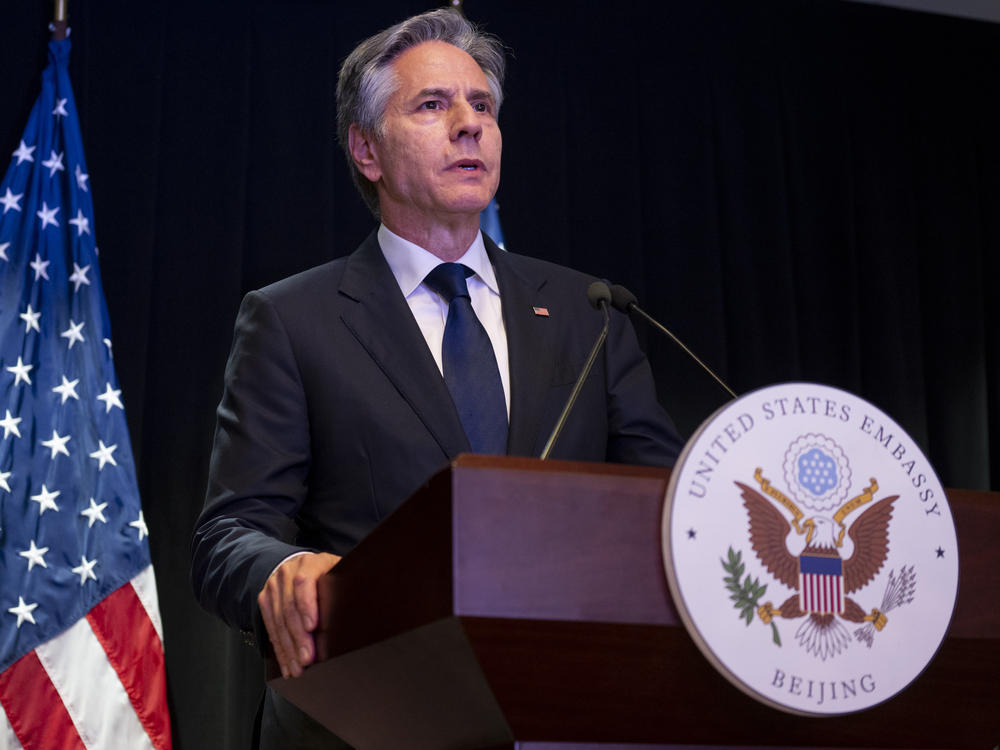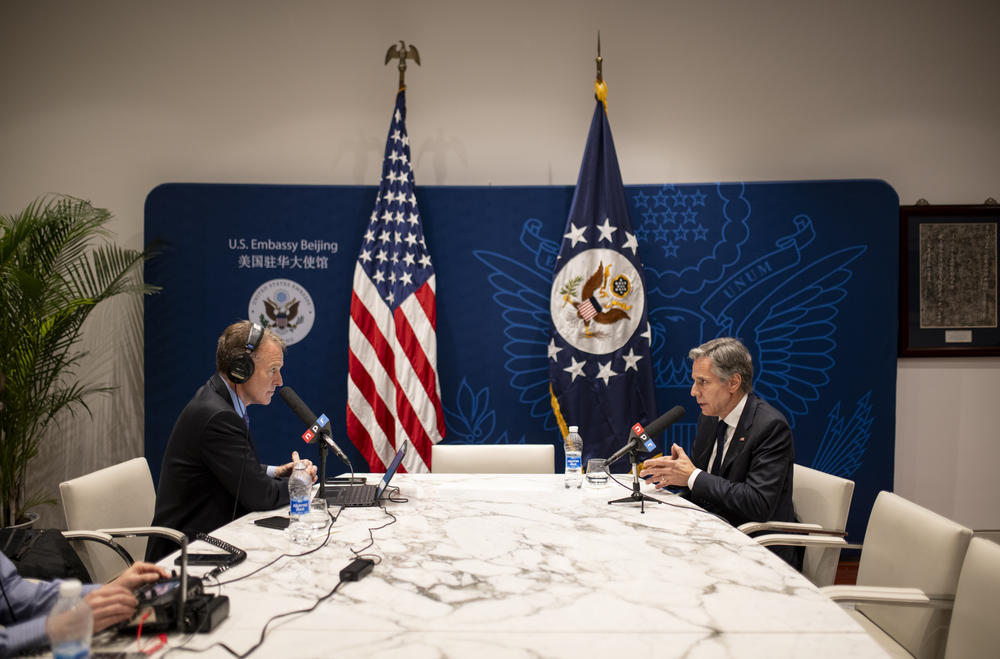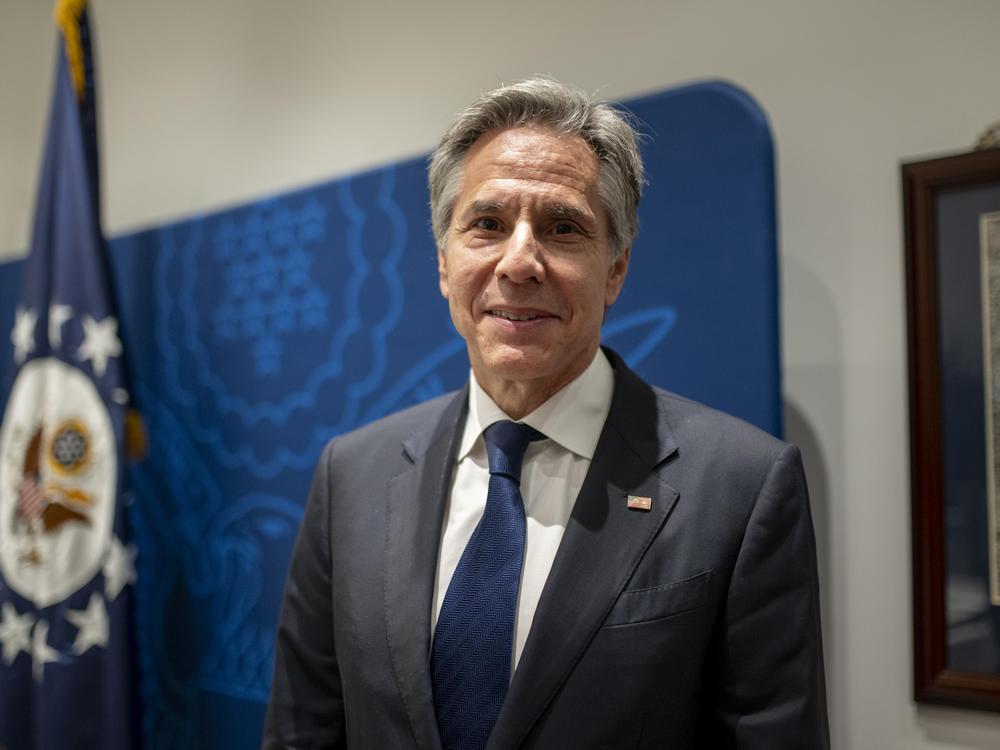Section Branding
Header Content
Blinken tells China it's in their interest to stop helping Russia
Primary Content
BEIJING — Secretary of State Antony Blinken concluded his visit to China with a meeting with Chinese leader Xi Jinping, urging more communication between the U.S. and China even as both men agreed both superpowers did not see eye to eye on a multitude of issues.
The secretary of state spoke with Morning Edition's Steve Inskeep after meeting China's leader in Beijing.
The U.S. has alleged China is selling vital components to Russia's defense industry after Russia's full-scale invasion of Ukraine. Blinken told Morning Edition that he warned Chinese counterparts helping Russia is against China's interests, because China wants better relations with European nations that see Russia as a threat.
"If China won't act, we will," Blinken said.
The top U.S. diplomat did not say how Chinese leaders replied in private. But in public, China's foreign ministry rejected the American's advice — saying that the U.S. is "hypocritical" to complain about China's trade with Russia while it aids Ukraine.
The exchange highlights the tense relations between the two nations — with their diplomats frequently being in the same room while not always on the same page.
This interview has been lightly edited for length and clarity.
To listen to the full interview between NPR's Steve Inskeep and Secretary of State Antony Blinken, use the audio player at the top of this page.
Steve Inskeep:
I have followed China's public statements during this day of meetings that you've had. And the public statements are pretty pointed. China alleged the US has suppressed their economic development and said the U.S. attacked China's core interests, which is pretty harsh as diplomatic language goes. Was President Xi any different in private?
Sec. Blinken:
We had very direct, very candid, but also, in many ways, constructive conversations about two things. If you go back to the meeting between President Biden and President Xi at the end of last year, in San Francisco and Woodside, they agreed that it was very important, first of all, that we have these regular lines of communication. We had an obligation to manage this relationship responsibly, including dealing very directly with our differences, and also seeing if we could build areas of cooperation where it was in our mutual interest.
Inskeep:
One thing you were focused on was trying to get China to stop giving aid to Russia's military as it invades Ukraine. And we can talk about China's attitude here because they've made a public statement. Their foreign ministry spokesman was asked today about ending aid to Russia and he said, look, we trade with Russia and you guys aid Ukraine. You're hypocrites. That sounds like a no, we're not stopping. Seemed to be what they were saying.
Sec. Blinken:
Here's the problem: What China's doing now is not providing weapons to Russia for use in Ukraine, as, for example, North Korea and Iran are. But it is the number one supplier of the critical components for Russia to rebuild its defense industrial base-- machine tools, microelectronics, optics and other things that are going right into a massive production of munitions, of weaponry, of tanks, of armored vehicles, which in turn are going into Ukraine. This is not only a problem for us, it's not only a problem for Ukraine. It's a problem for virtually everyone in Europe because they see this as helping to perpetuate the Russian aggression in Ukraine. They also see it as creating a growing threat to Europe's security.
One of the things that I shared with our Chinese colleagues is that at the very same time that they're trying to develop better relations with Europe, they can't be doing that while at the same time helping to fuel what is the biggest threat to Europe's security since the end of the Cold War. Now, we've already taken steps ourselves. We're prepared to do more if China is not prepared to act to curb this activity.
Inskeep: So you're trying to tell them it's in their interest to stop aiding Russia. But you also told reporters just a short time ago, "if China does not address this problem, we will." What power do you have?
Sec. Blinken: Well, as I said, you've already seen us take action against more than 100 Chinese entities with with sanctions, applying export controls. There are other measures that we're fully prepared to take. And as I said before, if China won't act, we will.
Inskeep:
In October, the United States issued new regulations that denied Chinese firms access to the most advanced semiconductors and chips. How much has that one step altered the competition between these two countries?
Sec. Blinken:
One of the things that we're very focused on is making sure that when it comes to the highest end technology, we're not in the business of providing or selling things that could be turned against us to undermine our own security. And so what we've done, as we've said, is to work to build a very high fence around a very small yard, because this is not about decoupling our economies. It's not about cutting off trade and investment with China. And as I mentioned a little while ago, we remain the number one market for Chinese products around the world, and there remains significant American investment in China. But when it comes to sensitive technology, we're going to be very, very sure that the most sensitive technology does not wind up where it could turn around and hurt us.
Inskeep:
So while we're here in Beijing, we've been talking with a lot of people. And we met a university professor who said America's reputation has declined here, in part because of U.S. support for Israel in its war against Hamas. Then there was a headline in a Chinese paper today, "Chinese satellites detailed destruction to Gaza from the war." And it's been widely reported that China is playing up this conflict in the global south in many nations to undermine the United States. How can you respond to that?
Sec. Blinken:
Look, I can't—you know—focus on what they may be saying or doing inside of China. But what I can focus on is two things. One, of course, is what we're doing in the Middle East, both to try to bring this conflict to an end as quickly as possible in a way that allows Israel to ensure that October 7th never happens again, but also to do everything we can to protect the men, women, and children who are caught in this crossfire of Hamas' making.
When it comes to China, one of the things we actually discussed was the Middle East. And I've had, I think, six conversations with my Chinese counterparts since October 7th. I actually believe that China could play a constructive role in trying to make sure that conflict doesn't spread, that we don't see escalation because it has relationships. It has influence with critical countries in the region, including, for example, Iran. So what I'm focused on is trying to encourage China to use that influence in a productive way.



